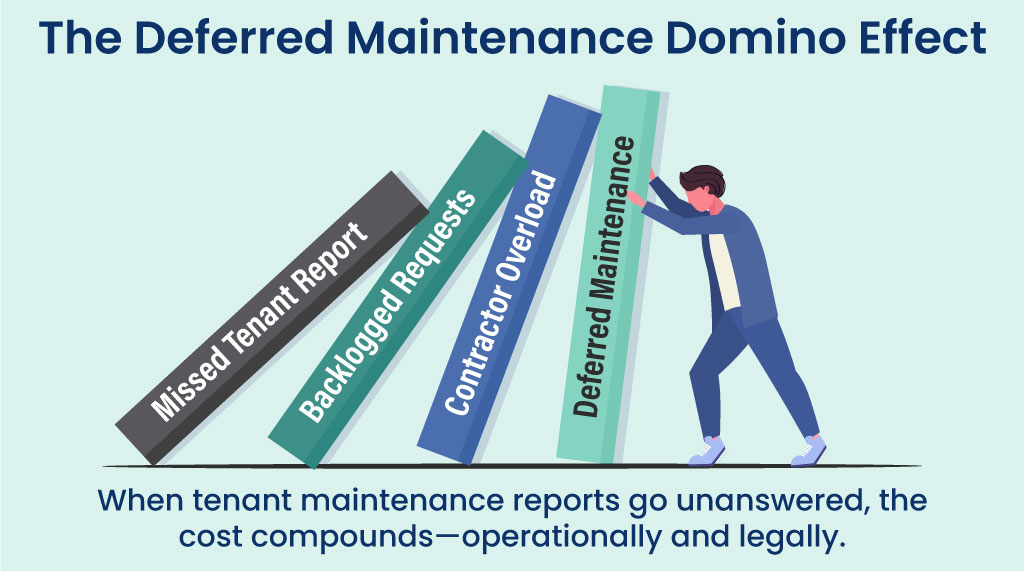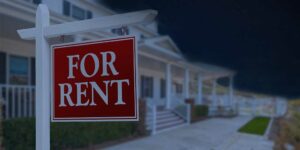In real estate, deferred maintenance on your rental properties may seem like a necessary cost- and time-saver, but in reality, it’s one of the most expensive risks a property manager can take. When upkeep gets deferred for too long, the legal, financial, and operational risks can spiral out of control. Also, you may have noticed that residents are pretty demanding these days when it comes to fixing something that’s broken. Because they’re armed with smartphones, and aren’t shy about using them, failing to respond could result in reputational damage to the property and to your business.
Bottom line: A single unanswered maintenance call could cost you thousands — or worse, your reputation.
What is Deferred Maintenance?
Deferred maintenance is the practice of putting off or ignoring regular property repairs and upkeep as a result of financial, scheduling, or staffing shortages. Think of it like putting a repair on a high-interest credit card — it might give you a temporary break today, but the longer you wait, the more it costs you in the end. Every fix that is neglected subtly builds up interest in the form of hidden damage, resident discontent, and compliance issues. What begins as a small leak beneath a sink eventually becomes a flooded unit and inbox.
Property managers know all too well: buildings don’t forget. That broken handrail, aging HVAC unit, or mystery stain in the ceiling? They’re not going away — they’re compounding. And when the bill comes due, it’s rarely at a convenient time.

Deferred Maintenance = Deferred Disaster
Ignoring or delaying maintenance often leads to bigger problems down the road. For example, the U.K. faces a staggering $60 billion public maintenance backlog, demonstrating how deferred repairs can snowball into massive costs. In the U.S., similar patterns are emerging as hidden costs surface in major ways — whether through structural damage or skyrocketing repair bills. Addressing issues in a timely manner is way more cost-effective than waiting for disaster to strike.
Real-World Consequences
Resident complaints can pale in comparison to the impact of highly visible, catastrophic damage that can occur from deferred maintenance. The recent Santa Cruz Wharf collapse is a cautionary tale of what happens when repairs get delayed for too long. The wharf’s structural failure required emergency fixes and caused reputational harm to the city. While no one was seriously injured, this incident highlights the risks property managers face when maintenance gets postponed.
Residents Aren’t Waiting Around
Today’s renters demand speed and professionalism when resolving maintenance issues. Changing expectations in the North American rental market mean residents are less willing to tolerate delays. If the response isn’t prompt, your residents may already be browsing other listings. Meeting these rising standards is essential for retaining residents and maintaining occupancy rates.
Maintenance Delays = Negative Reviews = Lost Revenue
Resident dissatisfaction from slow repairs, poor communication, or unresponsive management is one of the top drivers of turnover. According to U.S.-based survey data from the 2024 Voice of the Resident Report by the Widewail Multifamily Reputation Index, one in three negative reviews stem from upkeep issues. Negative reviews can hurt your online brand and impact your leasing rate pricing. The rental market is already competitive enough without having to perform damage control for negative reviews. A proactive approach to maintenance protects your reputation, your bottom line and resident satisfaction and trust.
Don’t Rely on Residents to Speak Up
Because many residents don’t report small issues until they become big ones, proactive outreach campaigns — such as quarterly check-in calls or texts — can uncover hidden problems before they escalate. For instance, a simple “How’s your unit?” call might reveal leaks or appliance strain that could lead to costly damage if left unaddressed.
How Call Center Triage Prevents Chaos
Have you considered a dedicated property management call center like AnswerNet? A call center isn’t just for taking after-hours calls — it’s your frontline defense against property damage, compliance risks, and burnout among your maintenance employees. AnswerNet’s key call center features include:
- 24/7 multilingual response for issue identification and reassuring residents that help is on the way.
- Prioritization of issues according to level of urgency.
- Vendor dispatch coordination for managing conversations between technicians and residents.
- Proactive resident outreach to catch issues early.
- Maintenance call logging for legal compliance.
AnswerNet call centers are a valuable and essential tool for property managers for ensuring timely responses, preventing small problems from turning into emergencies, and enabling them to focus on core management tasks.
Avoid the Costly Silence
A missed maintenance call today could become a lawsuit or vacancy tomorrow. Don’t let silence cost you big bucks or your reputation. Reach out today to talk to one of our team’s Resident Support Specialists.











